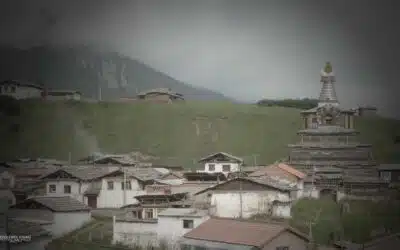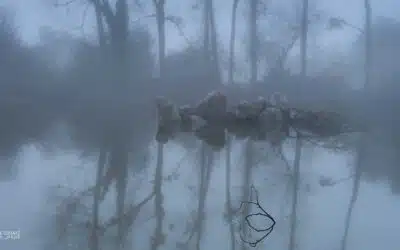The Woman and the Vampire

Written By Mila Khyentse
Blog | Reflections on death | Reflections on life | What about me?
With the article “The Woman and the Vampire” written by Mila Khyentse Rinpoche, it is Halloween time in the Himalayas!
The Woman and the Vampire
A long time ago, but not so long ago, there lived a couple near the monastery where my Dzogchen master, Lobsang Dargye Gyamtso Rinpoche, then a young novice, lived.
This couple were like many Tibetan couples of the time: industrious, hardworking and good traders. The husband regularly drove his caravan from eastern Tibet, in Amdo, to the Chinese plains of Sichuan and Yunnan, mainly to buy tea and sell salt or ore. He would often set off on a month-long journey, returning with his yaks heavily laden. Then, a few months later, he’d leave again.
One day, leaving his wife in charge of the store, as was his custom, he had to leave again for two months. It was the beginning of March, and he was due to return around the beginning of May.
During these two months, the wife acquitted herself admirably, as she always did. During the day, she sold or exchanged goods, and in the evenings, she mended, repaired or sewed new clothes for the couple, in the company of her family or visiting friends.
Realizing that what she had taken for her husband wasn’t really him, the woman froze in place… She died three days later.
One day in early May, at dusk, the door opened with a bang, perhaps caused by a gust of wind, the wife thought. She was surprised and delighted to see her husband enter as soon as the door was opened! At last he had returned from his journey! They fell into each other’s arms, and she couldn’t help noticing how thin he had become, how pale his complexion. It must be the fatigue and strain of walking and travelling, she thought.
She immediately asked him a lot of questions: had he eaten enough? Had he rested enough at the rest stops? Had he made a good profit in the city? Her husband smiled but said nothing. He pointed at his throat, as if he couldn’t speak. A cold, perhaps?
Then she gently asked him to sit down while she prepared a nourishing thoukpa, a noodle soup. They ate in silence, smiling at each other, the woman interrupting the meal with small, harmless phrases.
Then they went to bed, and decency forbids me to speak of what followed, although the story I heard from my master didn’t mention it either, except perhaps for a few laughs…
In the morning, the bed was empty on the husband’s side. The wife, worried, got up, dressed in a hurry and ran to her husband’s storehouse, where his animals and goods were, thinking that she would logically find him there. No one had arrived, it was too early, and there was no sign of her husband.
Then Penpa, one of the yak herders, arrived. She immediately noticed that he turned livid when he saw her. She asked him if he’d seen his boss, but all she could get out of him was: “Sorry, sorry, we should have come earlier! Sorry, sorry, sorry! But we didn’t want to disturb you last night…”. Why was he sorry? She was just wondering where her husband had gone, because he had left the house very early this morning after coming home the night before, and she couldn’t understand why he had disappeared at that hour. Penpa grew even more pale. Finally he said: “Madame, your husband fell to his death in the mountains on our return journey over a week ago.”
Realizing that what she had taken for her husband wasn’t really him, the woman froze in place… She died three days later.
The Tibetan world is full of terrifying stories like these. Scary stories that are told at the evening vigil.
My master told me this story one evening when we were discussing the transmission of the practice of ‘taming the eight classes of evil beings’. According to him, the violent death of the woman’s husband, whom my master had both known, had allowed a demon, a kind of vampire, to take over the life force of the unknowing widow. At least that’s what was said at the time, since she didn’t kill herself.
So be careful who you let into your house when a gust of wind opens the door, especially at dusk!
More Posts
Diebu
In this article, “Diebu,” Mila Khyentse discusses the places of the lineages, particularly that of Diebu.
Be authentic!
In "Be Authentic!" Denis explores authenticity in the master-disciple relationship, a living space in which the nature of mind is recognized.
The First Day
In this article "The First Day", Mila Khyentse talks about the first day of the Tibetan year and what we usually do in a primordial way.




